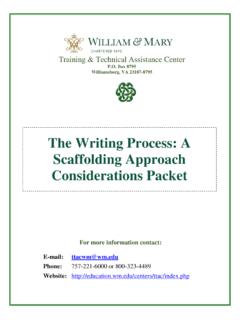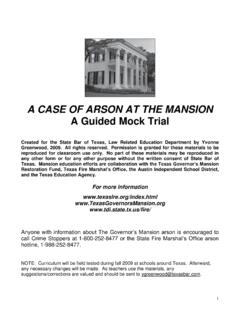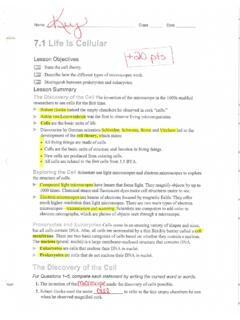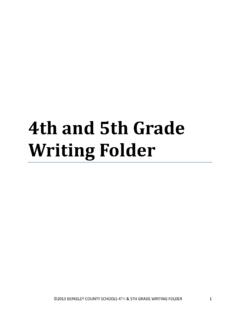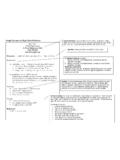Transcription of Guidance - GOV.UK
1 Guidance Curriculum and Standards Headteachers, E xcellence and Enjoyment: teachers and Learning and teaching for bilingual teaching assistants in children in the primary years Key Stages 1 and 2, primary consultants Teaching units to support guided sessions for writing in Status: Recommended English as an additional language (pilot material) Date of issue: 03-2007. Ref: 00068-2007 FLR-EN. Excellence and Enjoyment: Learning and teaching for bilingual children in the primary years Teaching units to support guided sessions for writing in English as an additional language (pilot material).
2 This folder and CD-ROM contain material to be piloted in 2007-08. They include guided teaching units to supplement sentence level work for children in Years 2-6. The CD-ROM contains resources using Clicker 5 and a full version of the contents of this folder in a PDF document. Your feedback is essential in improving the materials. Please use the feedback form in the introduction (pages 20-21) for your comments and suggestions for improvement. An electronic version of this form can be found on the accompanying CD-ROM (00170-2007 CDO-EN).
3 Acknowledgement We gratefully acknowledge the contribution of Crick Software (with Clicker 5) in assisting to produce the materials available on the CD-ROM (00170-2007 CDO-EN) accompanying this publication. Teaching units to support guided sessions for writing in English as an additional language (pilot material). Contents Contents Part 1: Introduction and rationale 03. Aims of the materials and intended outcomes for learners 04. Implementing the 2006 Primary Framework 06. Using the materials 07. Overview of the teaching units 13.
4 Teaching units to support guided work 14. Research that informs the materials 14. Feedback form 20. Frequently asked questions 22. Part 2: Teaching units to support guided sessions 25. Year 2 27. Unit 1: Prepositions 27. Unit 2: Past and present tense verbs 41. Unit 3: Determiners 55. Year 3 75. Unit 4: Adjectives 75. Unit 5: Prepositions 97. Unit 6: Determiners 121. Unit 7: Subject verb agreement 143. Year 4 155. Unit 8: Adverbs 155. Unit 9: Phrasal verbs 175. Year 5 191. Unit 10: Adverbial phrases 191. Unit 11: Modal verbs 207.
5 Year 6 225. Unit 12: Adverbial clauses 225. Appendices 245. Appendix 1: Assessment for learning: analysing writing to identify 245. learning needs Appendix 2: Sharing learning objectives and success criteria 251. Appendix 3: Providing effective oral and written feedback to children 253. on their own learning Appendix 4: Developing peer and self-assessment 257. Appendix 5: Teaching units in Grammar for writing and Developing 259. Early writing which support whole-class teaching Appendix 6: Instructions for the generic sentence level activities 261.
6 Appendix 7: Some grammatical terminology 271. Appendix 8: Glossary of grammatical terms 273. Appendix 9: Useful references and resources 324. Teaching units to support guided sessions for writing in English Crown copyright 2007 as an additional language (pilot material) 1. 00068-2007 FLR-EN Primary National Strategy Defining terms EAL stands for English as an additional language and recognises the fact that many children learning English in schools in this country already know one or more other languages and are adding English to that repertoire.
7 Terms Bilingual is used to refer to those children who have access to more than one language at home and at school. It does not necessarily imply full fluency in both or all of their languages. Advanced learner of EAL is a term used by Ofsted to describe children who have had considerable exposure to English and are no longer in the early stages of English language acquisition. These are children, often born in this country, who appear to be fluent in ordinary everyday conversational contexts, but who require continued support to develop the cognitive and academic language necessary for educational success.
8 Minority ethnic group is used in this publication for all those groups other than the White British majority. Although children from these groups may well form the majority in some school contexts, they are still members of groups in a minority nationally and will continue to be referred to as children from minority ethnic groups. Most children learning EAL are from minority ethnic groups. School Census data shows that only a very small percentage of EAL learners are White. Teaching units to support guided sessions for writing in English 2 as an additional language (pilot material) Crown copyright 2007.
9 Primary National Strategy 00068-2007 FLR-EN. Part 1. Introduction and rationale Introduction and rationale Teaching units to support guided sessions for writing in English Crown copyright 2007 as an additional language (pilot material) 3. 00068-2007 FLR-EN Primary National Strategy Aims of the materials and intended outcomes Introduction and rationale for learners This folder and CD-ROM contain pilot materials in the form of guided teaching sessions that aim to address the specific needs of advanced EAL. learners in developing writing .
10 The materials are designed to be used by a trained adult working with small groups of children in Years 2 6 as part of day-to-day quality first teaching'. In recent years significant progress has been made in raising standards for children in primary schools. Many individual children from minority ethnic groups, including those for whom English is an additional language, are achieving impressive results. However, this is not true for all children who are learning EAL or learning through EAL. There is a strong emphasis in Excellence and enjoyment: a strategy for primary schools (DfES 0377-2003), which outlines the Primary National Strategy, on personalising learning to meet individual children's needs and on ensuring that the education system is not discriminating against any particular group of children.











